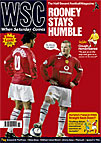 While the east midlands mourns a great manager, Brian Clough's native region has lost a great player. Harry Pearson traces a legend's goalscoring career
While the east midlands mourns a great manager, Brian Clough's native region has lost a great player. Harry Pearson traces a legend's goalscoring career
It was during the 1986 World Cup. England had got off to a pathetic start and in the ITV studio Mick Channon was lamenting the inability of English players to “get by people”. “The Brazilians do it,” he burbled. “The French do it. The Danes do it…” From off camera came an unmistakable whine: “Even educated fleas do it.” Brian Clough may have won titles and European Cups, but the queasy, humiliated expression that remark put on Channon’s medieval mug will likely live longer in my memory than any of them. To anyone who grew up on Teesside the tone, if not the accent (Clough’s peculiar vocal style was all his own) was unmistakable. Funny undoubtedly, but also scornful, the humorous equivalent of a slap in the face.
Born and brought up in the Grove Hill area of Middlesbrough, Clough must have had plenty of chance to practise those withering put-downs, if only in self-defence. Nowadays cockiness is seen as a not-entirely-negative trait; some even view it as a prerequisite to sporting success. But back then self-regard was a mortal sin. The slightest sign of confidence was mercilessly crushed. Nobody liked a bighead. And Clough was by all accounts a monstrous egotist right from the start. A schoolmate of my father had been goalkeeper in our village team. One Saturday in the 1950s they had played a Great Broughton side featuring a teenage centre-forward – Clough. The adolescent had scored three times and, at the end of the game, gone over to my mate’s father, given him a consoling pat on the shoulder and said: “Don’t worry, one day you’ll be telling your mates Brian Clough put a hat-trick past you.” Which was true as it turned out, though it’s hard to imagine anyone was impressed at the time.
Clough signed for Middlesbrough – the team he had supported since boyhood – from Great Broughton in 1955. Photos show a sharp-featured face beneath a Woody Woodpecker quiff. His skin is so pale it looks as if he has lain under a sun lamp switched to “suck” and his dark eyes are shiny with energy. His scoring record for Boro was extraordinary. In his five full seasons at Ayresome Park his lowest tally was 36. Yet he was never popular with his team-mates. His quest for goals was said to have been so single-minded he shoved better-placed colleagues out of the way so he could score himself. He allegedly sulked after defeats and criticised others on the field of play; he was accused of being arrogant, scathing and combative.
Clough hit back with accusations of his own, more serious ones. Boro were mired in the old Second Division and apparently incapable of escape no matter how many times their centre-forward found the net. Clough believed there was something more sinister behind the situation than mere mediocrity. He went public, alleging his team-mates had a habit of betting on themselves to lose, then ensuring they did so by deliberately conceding goals. The accusations led to fisticuffs in the dressing room and when Clough was made captain nine players signed a round-robin letter to the directors asking for him to be removed.
The Boro crowd took the majority view (though few supporters these days doubt Clough’s version) and in the next home game barracked the skipper from the kick-off. He responded in typical style – scoring a hat-trick, all with shots from outside the area. That his swagger survived in the venomous atmosphere at Ayresome is an extraordinary testimony to his toughness, mental and physical. In the end you suspect the boasting was more about challenging doubters than an act of self-promotion.
While at Boro, Clough had put in transfer requests every season without fail. He was linked with Everton and Birmingham, but eventually went to Sunderland for £55,000. He liked it much better at Roker Park and hit 63 goals in 74 appearances, before a collision with Bury goalkeeper Chris Harker smashed his knee. He struggled gamely to recover. But though 20,000 turned out at Roker Park to watch his comeback for the reserves, he made only three more appearances for the first team before being forced to quit. He was 29.
It is hard now to see Clough’s playing days as anything but a prologue to his brilliant management career, but in many ways it was his time at Middlesbrough and Sunderland that formed him as a man. He was bright, brash and outspoken before he arrived at Ayresome Park, but his experiences with his hometown club stirred bitterness and frustration into the mix. It was there, too, that he met Peter Taylor, while the injury at Sunderland led to his first prolonged bout of drinking. His instinctive strong sense of right and wrong (evinced by his teams’ excellent disciplinary records and his hatred of gamesmanship) was affronted by Boro’s habit of frittering away matches for financial gain; the fact that the board turned a blind-eye added a mistrust of authority that would be vindicated years later at the Baseball Ground.
The thwarted ambition, the back-stabbing and the sense of injustice made him what he sometimes was – particularly during the “Mike Yarwood” years at Derby, Brighton and Leeds: awkward, confrontational and belligerent, a man determined that no one should get by him again.
From WSC 213 November 2004. What was happening this month
Did boro actually do this though?